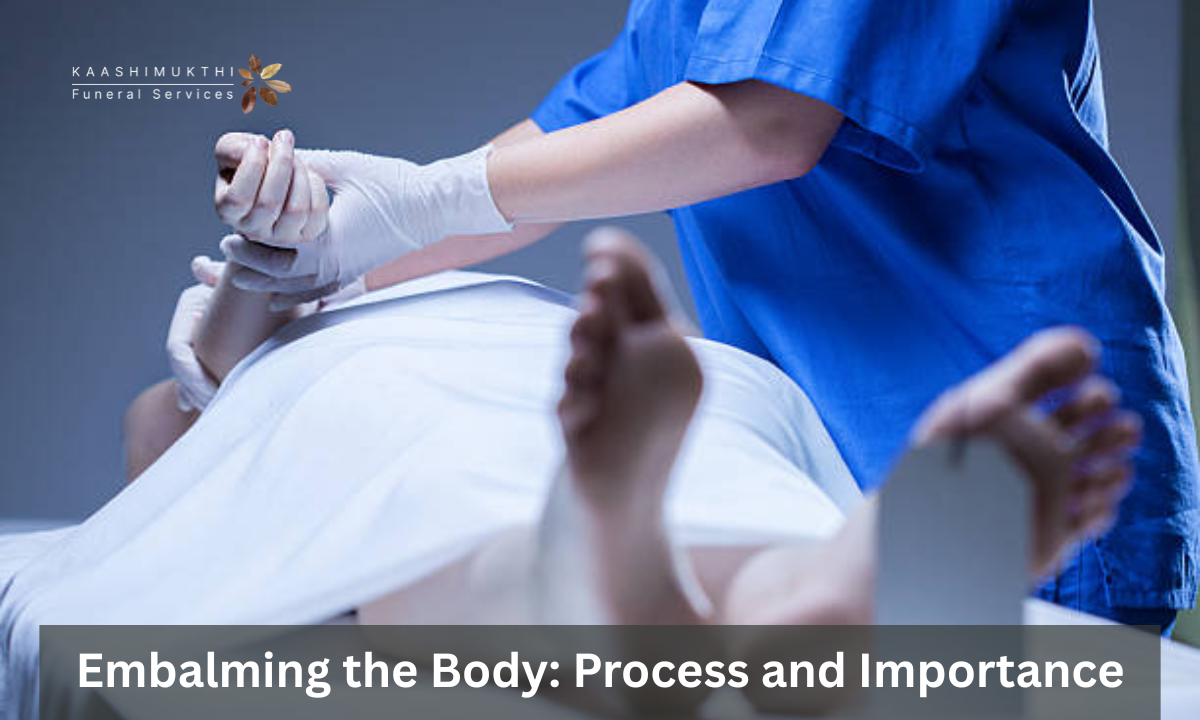Embalming the body is one of the most important steps in preserving dignity and respect during funeral arrangements, especially when there’s a need to delay cremation, burial, or transport the body over long distances.
In simple terms, embalming involves scientifically treating the body to slow down decomposition and maintain a lifelike appearance. It provides families the time and peace to say their final goodbyes in a serene environment. Understanding the meaning and its purpose helps families make informed choices when planning last rites or repatriations.
In this guide, we will explain what embalming is, how it’s done, why it’s essential for funeral processes, and how modern funeral services in India integrate it seamlessly to ensure dignity and care.
What Is Embalming?

The term ‘embalming‘ comes from ancient traditions where bodies were preserved for religious and cultural reasons. Today, body embalming is a scientific procedure performed by trained professionals to preserve the body’s appearance, prevent decomposition, and maintain hygiene before cremation, burial, or transportation.
It allows families to conduct viewings, rituals, and ceremonies with comfort, knowing their loved one’s remains are handled respectfully.
Embalming Meaning in Modern Context
In modern practice, the meaning of embalming extends beyond preservation; it symbolizes care, respect, and readiness. It ensures the deceased can be transported safely across states or even countries. For instance, when transporting a dead body by air, embalming is mandatory by airline and health regulations. This ensures hygiene and compliance during long-distance travel and prevents any risk of infection or odor.
The Process of Embalming the Body
The process of embalming the dead body is performed by a certified embalmer and a funeral director in a clean, controlled environment.
It usually involves the following steps:
| Step | Description |
|---|---|
| 1. Preparation | The embalmer cleans and disinfects the body carefully. |
| 2. Arterial Injection | A preservative fluid is injected through the arteries to replace body fluids. |
| 3. Cavity Treatment | Internal organs are treated to prevent decomposition. |
| 4. Dressing and Cosmetics | The body is dressed and prepared for viewing or ceremonies by applying cosmetics to retain the natural look. |
Each step is performed with utmost respect, following ethical and hygienic standards.
Importance of Embalming in Funeral Arrangements
Embalming is not just a technical process; it’s an emotional and cultural act of honoring the departed.
Here’s why it matters in funeral arrangements:
- It provides time for family members travelling from afar to arrive before the final rites.
- It allows dignified viewing and farewell ceremonies.
- It’s essential for long-distance transportation or repatriation services.
- It ensures safety, hygiene, and preservation before cremation or burial.
When combined with organized funeral services in India, embalming ensures that every detail, from preservation to ceremony, is handled with precision and compassion.
When Is Embalming Required?
Embalming becomes essential under the following circumstances:
- When transporting the body over long distances or internationally.
- When funeral rituals are delayed due to family travel or legal formalities.
- For open-casket ceremonies that allow family members to pay their respects.
- For public figures or extended rites where preservation is crucial.
In each of these situations, embalming maintains the natural look and ensures hygiene during ceremonies.
Role of Funeral Directors and Professionals
A funeral director plays a key role in organizing embalming, documentation, and overall coordination. They oversee preservation, arrange for transport or cremation, and ensure that rituals align with family beliefs and customs.
They also coordinate with crematoriums, transportation providers, and florists to manage every detail, from the embalmed body to floral arrangements and antim sanskar samagri (last rite essentials). This ensures a complete, well-organized farewell that blends tradition and professionalism.
Connection Between Embalming and Repatriation Services
For families facing the loss of a loved one abroad, repatriation services ensure the safe return of the body to India. Airlines and international health regulations require that the body be embalmed and sealed in a zinc-lined coffin.
Without embalming, authorities do not permit international air transport. This makes embalming a vital step in global funeral logistics. It’s a way of ensuring the deceased returns home respectfully and safely, in compliance with all international standards.
Tips for Families Considering Embalming
We understand that discussing embalming can feel uncomfortable. However, it’s a crucial part of responsible funeral planning.
Here are a few tips for families:
- Ask your funeral provider about certified embalmers and facilities.
- Ensure proper documentation; embalming certificates are needed for air or interstate transport.
- Discuss preservation duration with professionals if the rituals will take several days.
- Use a freezer box for added preservation when required.
- Choose experienced providers who understand cultural sensitivities and rituals.
Integration with Funeral and Cremation Services
Embalming often marks the first step in the complete funeral process, leading up to cremation services in India or burial. After embalming, families proceed with religious rituals and floral decorations before cremation.
Modern funeral services in India now provide all-in-one support, combining embalming, transportation, rituals, and coordination with crematoriums to ensure smooth arrangements. This integrated support helps families focus on prayers, remembrance, and healing rather than logistics.
Final Thoughts
Embalming the body is a process that upholds dignity, hygiene, and respect in the most sensitive moments of life. It bridges tradition and science, allowing families to conduct meaningful farewells with grace. By preserving the body, ensuring safe transport, and maintaining peace of mind, embalming becomes an essential part of every dignified send-off. That’s why trusted funeral services in India emphasize professional embalming, coordination, and compassion in every step of the journey.
At Kaashimukthi, we understand that saying goodbye is never easy. Our experienced team ensures that embalming, rituals, and arrangements are handled with care, respect, and complete professionalism, helping families find peace during loss.
Frequently Asked Questions
1. What does embalming the body mean?
It means preserving the body by replacing natural fluids with chemicals, slowing decomposition, and maintaining a natural appearance for viewing, transportation, or ceremonies.
2. Is embalming necessary for transportation?
Yes. For long-distance or international transport, embalming is mandatory for safety, hygiene, and compliance with airline and health regulations.
3. How long does an embalmed body last?
An embalmed body can remain preserved for several weeks, depending on climate and storage conditions, especially when kept in controlled environments.
4. Who performs the embalming process?
Certified embalmers or trained professionals under the supervision of a funeral director perform embalming using approved techniques and preservation chemicals.
5. Does embalming affect religious ceremonies?
No. Embalming only preserves the body temporarily; it doesn’t interfere with religious beliefs or traditional funeral customs, including cremation or burial rites.

Madhu is an Entrepreneur, a Mentor, a Writer and an Aspiring Car Race Driver. He is Deeply passionate about leveraging Technology and Human Centred Design to make complex care and End of Life Planning easier. With the ultimate aim of Improving the quality of Life in the Twilight years. Madhu is highly educated and Alumni of IIM-Bangalore, Sikkim Manipal University and Bangalore University besides a Rich Industry Experience in the field of Product Management, Design, Supply chain, Finance, Commercial Management and Funeral Services.

